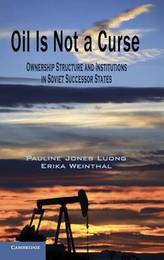
|
Oil Is Not a Curse: Ownership Structure and Institutions in Soviet Successor States
Hardback
Main Details
| Title |
Oil Is Not a Curse: Ownership Structure and Institutions in Soviet Successor States
|
| Authors and Contributors |
By (author) Pauline Jones Luong
|
|
By (author) Erika Weinthal
|
| Series | Cambridge Studies in Comparative Politics |
|---|
| Physical Properties |
| Format:Hardback | | Pages:446 | | Dimensions(mm): Height 234,Width 156 |
|
| ISBN/Barcode |
9780521765770
|
| Classifications | Dewey:320.947 |
|---|
| Audience | | Professional & Vocational | |
|---|
| Illustrations |
24 Tables, unspecified; 5 Maps; 16 Line drawings, unspecified
|
|
Publishing Details |
| Publisher |
Cambridge University Press
|
| Imprint |
Cambridge University Press
|
| Publication Date |
30 August 2010 |
| Publication Country |
United Kingdom
|
Description
This book makes two central claims: first, that mineral-rich states are cursed not by their wealth but, rather, by the ownership structure they choose to manage their mineral wealth and second, that weak institutions are not inevitable in mineral-rich states. Each represents a significant departure from the conventional resource curse literature, which has treated ownership structure as a constant across time and space and has presumed that mineral-rich countries are incapable of either building or sustaining strong institutions - particularly fiscal regimes. The experience of the five petroleum-rich Soviet successor states (Azerbaijan, Kazakhstan, the Russian Federation, Turkmenistan, and Uzbekistan) provides a clear challenge to both of these assumptions. Their respective developmental trajectories since independence demonstrate not only that ownership structure can vary even across countries that share the same institutional legacy but also that this variation helps to explain the divergence in their subsequent fiscal regimes.
Author Biography
Pauline Jones Luong is Associate Professor in the Department of Political Science at Brown University. Previously, she was an Assistant Professor at Yale University. At Harvard University, where she received her doctorate, she was an Academy Scholar from 1998 to 1999, and from 2001 to 2002. Her primary research interests are institutional origin and change, identity and conflict, and the political economy of development. Her empirical work to date has focused on the former Soviet Union. She has published articles in several leading academic and policy journals, including the American Political Science Review, Comparative Political Studies, Current History, Foreign Affairs, Politics and Society and Resources Policy. Her books include Institutional Change and Political Continuity in Post-Soviet Central Asia and The Transformation of Central Asia. Funding from various sources has supported her research, including the National Science Foundation, the John T. and Catherine D. MacArthur Foundation, the National Council on East European and Eurasian Research, and the Smith Richardson Foundation. Erika Weinthal is Associate Professor of Environmental Policy at the Nicholas School of the Environment at Duke University. From 1998 to 2005, she taught in the Department of Political Science at Tel Aviv University. Her research focuses on environmental and natural resources policy in the former Soviet Union and the Middle East. She has published widely in journals such as Perspectives on Politics, Comparative Political Studies, the American Political Science Review, Foreign Affairs, Ground Water, Global Environmental Politics and the Journal of Environment and Development. She is the author of State Making and Environmental Cooperation: Linking Domestic Politics and International Politics in Central Asia. She has received funding from a variety of institutions to support her research, including the National Research Council for Europe and Eurasia, the United States Institute of Peace, the John T. and Catherine D. MacArthur Foundation, the Fifth Framework Programme of the European Union and the USDA. She is a member of the UNEP Expert Advisory Group on Environment, Conflict, and Peacebuilding.
Reviews'The author's concluding chapter makes a reasonably, if not overwhelmingly persuasive case about why the resource curse hypothesis is a myth.' Gaurav Sharma, oilholicssynonymous.com
|